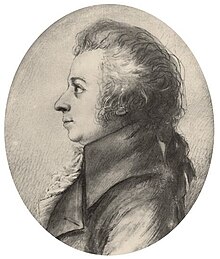The Marriage of Figaro - Simple English Wikipedia, the free encyclopedia
| The Marriage of Figaro | |
|---|---|
| by Wolfgang Amadeus Mozart | |
 Portrait by Doris Stock, 1789 | |
| Genre | Opera buffa in 4 acts |
| Native title | Le nozze di Figaro |
| Librettist | Lorenzo Da Ponte |
| Language | Italian |
| Based on | The Marriage of Figaro by Pierre Beaumarchais |
| Premiere | Burgtheater Vienna 1 May 1786 |
Le nozze di Figaro, ossia la folle giornata (The Marriage of Figaro, or The Day of Madness) is an opera buffa with music by Wolfgang Amadeus Mozart. Lorenzo Da Ponte wrote the Italian libretto (the text of the opera). The opera premiered at the Burgtheater, Vienna on 1 May, 1786. It was well received and nearly every scene received an encore, which made the performance really long. The Emperor did not like how long the perfomance was and wanted it to stop.[1]
The opera is based on the 1784 French play, La folle journée, ou le Mariage de Figaro by Pierre Beaumarchais. The play was very controversial in its day (and even banned briefly in France). But, Da Ponte removed the play's questionable material and the Viennese censors approved the opera.
Cast
[change | change source]- Count Almaviva
- Countess Almaviva (soprano), the Count's wife
- Figaro, Count Almaviva's servant and Susanna's betrothed
- Susanna (soprano), the Countess' maid and Figaro's betrothed
- Cherubino, a page boy
Story
[change | change source]The opera is set in the palace and gardens of Count Almaviva in Seville, Spain. Figaro, Count Almaviva's servant, is on the eve of marrying Susanna, the Countess' maid.
Act 1
The opera starts with Figaro and Susanna talking in their future bedroom. Figaro likes the room, but Susanna does not. Susanna thinks the room is too close to the Count's room. She says the Count is lusting after her and wants to make love with her. Figaro is very angry. Figaro says he will try to stop the Count's plans and try to trick him.
Figaro leaves the room and Dr. Bartolo and Marcellina come in. Marcellina is upset with Figaro, because he did not repay her money. She wants to sue Figaro. Bartolo says he will get revenge. Bartolo leaves. Susanna and Marcelina insult each other. Marcellina gets angry and leaves.
Cherubino comes into the room. He sings about his love for all women. Cherubino asks Susanna for help. The Count is upset with Cherubina, because he found Cherubino with another women. The Count comes in the room and Cherubino hides behind a chair. The Count tries to win Susanna over. Basilio comes in and the Count hides behind the chair. Cherubunio finds a new hiding spot. Basilio starts gossiping about Cheribunios love for the Countess.
The Count gets upset and comes out of his hiding spot. The Count tells about Cherubino and lifts the the dress from the chair. He sees Cherubino and gets very angry. Cherubino had heard everything. The Count punishes Cherubino, but allows him to have a job in the army. The Act ends with Figaro giving Cherubino advice about the military.
With Susanna and his friends, Figaro opposes the Count's intentions. Almaviva is forced to beg his wife's forgiveness.
References
[change | change source]- ↑ Roberts, Ashley (2018-02-15). "The opera that received encores for almost every scene | Opera Grand Rapids". Opera Grand Rapids. Retrieved 2018-02-26.


 French
French Deutsch
Deutsch